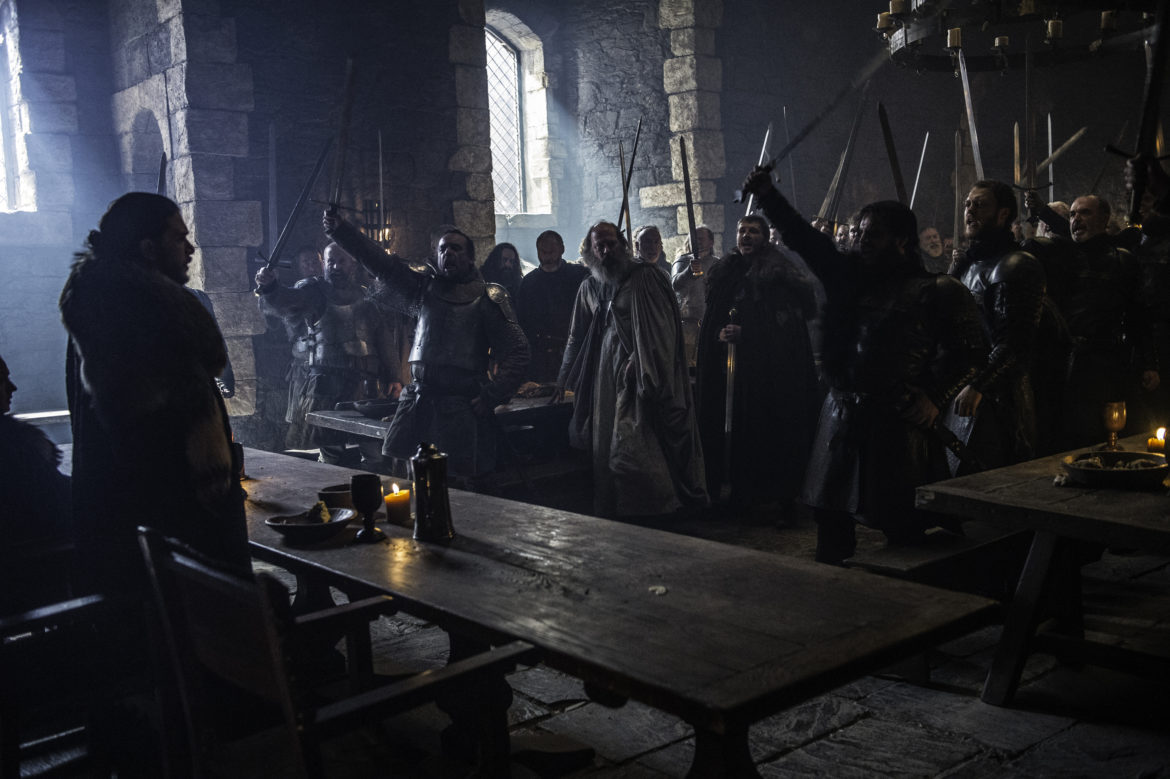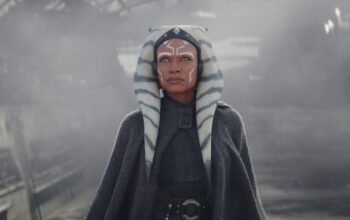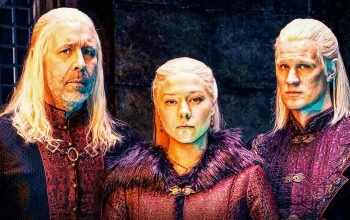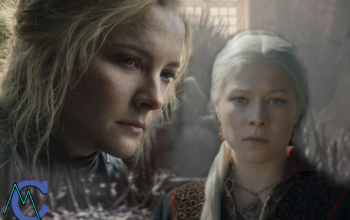After presenting our “Worst Game of Thrones” episode list, it is now time To unload the Best.
SPOILERS… obviously?
#13: Winter is Coming [s1 e1]

It is vitally important for a series premiere to establish its characters, who they are, and what are their places in the world. The first scene in Winterfell particularly does this well; Ned Stark clearly portrays the stern noble lord of a father, and Robb is his oldest protégée. Jon’s the bastard black sheep who has (understandably) never gotten along well with his stepmother, Catelyn. Arya is the adventurous tomboy daughter who shoots better than young Bran. So much character all that established in mere minutes of screentime.
Another key aspect that the premier must fulfill is world-building. While the following episodes explore the depths of the series’ grounded, realistic side (rooted in 3rd crusade-era technologies, tactics, and social structures), the cold open premiere reveals that there are also magical and fantastical elements in play.
For both myself and virgin audiences, the major impact of this episode is undoubtedly the infamous ending. Walking in on Jamie and Cercei’s… “twin bonding time” re-popularized the incest cliché (for better or worse) to the point where it confidently re-gained focus in popular period dramas that otherwise tried to avoid the fact that half of the European nobles were related. And, of course, Jamie tossing out Bran from the window after “witnessing history” and uttering his famous words “the things I do for love”.
Interestingly, this is the only episode with (location titles) over establishing shots for new locations and cities, no other episode has done that since.
Another interesting fact about the premiere was that it was entirely re-shot. Daenerys and Catelyn were played by different actors, and there was even a cameo by George R.R. Martin himself. However, some crucial details were missing, such as never establishing that Jamie and Cercei were siblings. It’s probably a good thing it was redone, as the rest of it was so bad, we probably never would have seen the rest of what was to come.
#12: Battle of the Blackwater [s2 e9]

Directed by Neil Marshall, whose previous claims to fame included action-based period films like Centurion, this was the first real battle sequence in the show. Even though Tyrion has made himself clear that he is not a battlefield commander, he does seem to excel well in strategy. And, much like many real-life wars and most medieval conflicts, there isn’t really one side to completely root for. Tyrion is the witty fan favorite fighting on the defense… but for king Joffrey. Stannis is thus far utterly unlikeable, but brings along his good-natured pirate buddy Davos to steal the show. Crecei, somehow, is chosen to give the sappy, sentimental narrator speech moment… while about to poison Tommen as the Baratheon forces were routed, a moment that feels like a weird twisted take on Sam Wise’s speech from Two Towers.
It was a great moment when Tyrion was leading the men at the gates destroying the battering ram, and the Lannister soldier cheering Tyrion’s nickname “half man” giving him a moment of glory and respect he neither expected nor sought only to be Tyrion to say “oh f*** me” when there’s still more Baratheon soldiers attacking. Then its undermined further when one of Joffrey’s King’s Guard sliced his face, knocking him out to the ground. Further taking away any recognition was the arrival of his father’s forces, who promptly asserted himself a new position as Hand of the King.
#11: The Watchers on the Wall [s4 e9]

Also directed by Neil Marshall, we see another siege battle, but the odds look even more one-sided against the defenders – barely 100 conscript watchmen vs 100,000 angry wildlings and literal giants.
Like earlier seasons, it still suffers from budget constraints as they can only film on one set, and there were limits to the CGI. There was a moment where Jon said to Janos Slynt “those are giants riding mammoths down there”. (Correction: 2 giants and 1 mammoth). Still, we got a giant with a giant bow, a fantasy concept I had yet to see on screen before – a mobile ballista.
Like the Long Night episode, it was also a fight in the dark, but this one was well-lit enough to understand what was actually going on. Marshall clearly knows how to shoot action well, as showcased with the legendary 360-degree tracking shot capturing all the characters. There was also a scene where Jon faces off against Styr/Magnar of Thenn and spits blood on Styr’s face to get the edge, a lesson he learned from fighting Karl Tanner a few episodes earlier. We also get a proper moment of closure between Jon and his love for Ygritte. But still (F*** Olly)
#10: A Knight of the Seven Kingdoms [s8 e2]
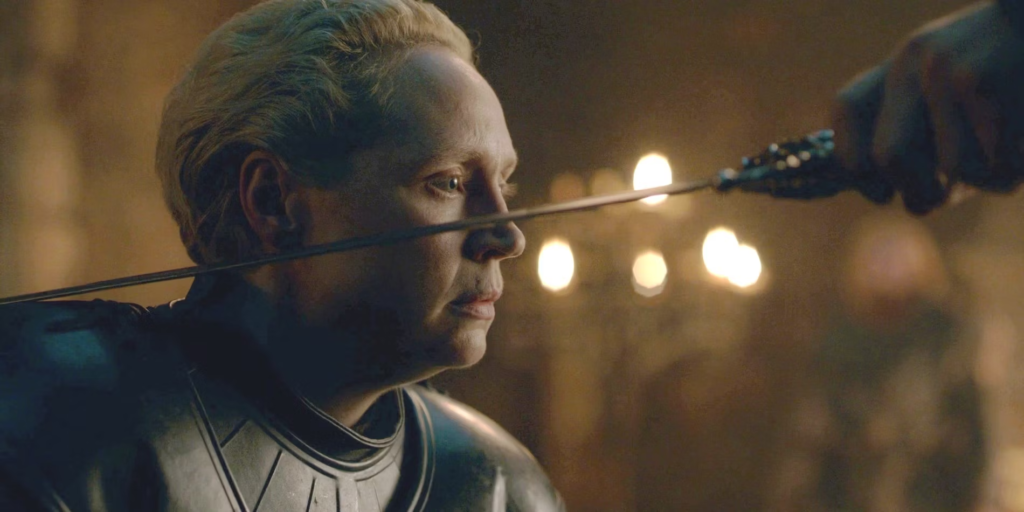
If there was one good episode from season 8, it was the episode before The Long Night (aka, our #4 Worst GoT episode).
We see Jamie facing the judgment of his past actions, including a one-on-one scene with Jamie and Bran, whom he hasn’t seen since their unfortunate run-in in the very first episode. I only wished there was a one-on-one scene with Jamie and Jon Snow considering this scene, now that their positions have been reversed.
However, the big highlight is having Tyrion, Jamie, Brienne, Podrick, Tormund, and Davos just hanging out around the fireplace contemplating their imminent doom. Sometimes the best scenes are just scenes with your favorite characters and just talking. There was a touching scene where Brienne becomes knighted by Jamie before battle – this was a subtle reference to the anthology book of the same title as G.R.R Martain confirmed that Brienne is a decedent of the famous Hedge Knight sir Duncan the Tall, for all my fellow book readers/lore miners out there.
Like Game of Thrones? Want to support the site? Buy The Hedge Knight on Amazon through us!
#9: Hardhome [s5 e8]
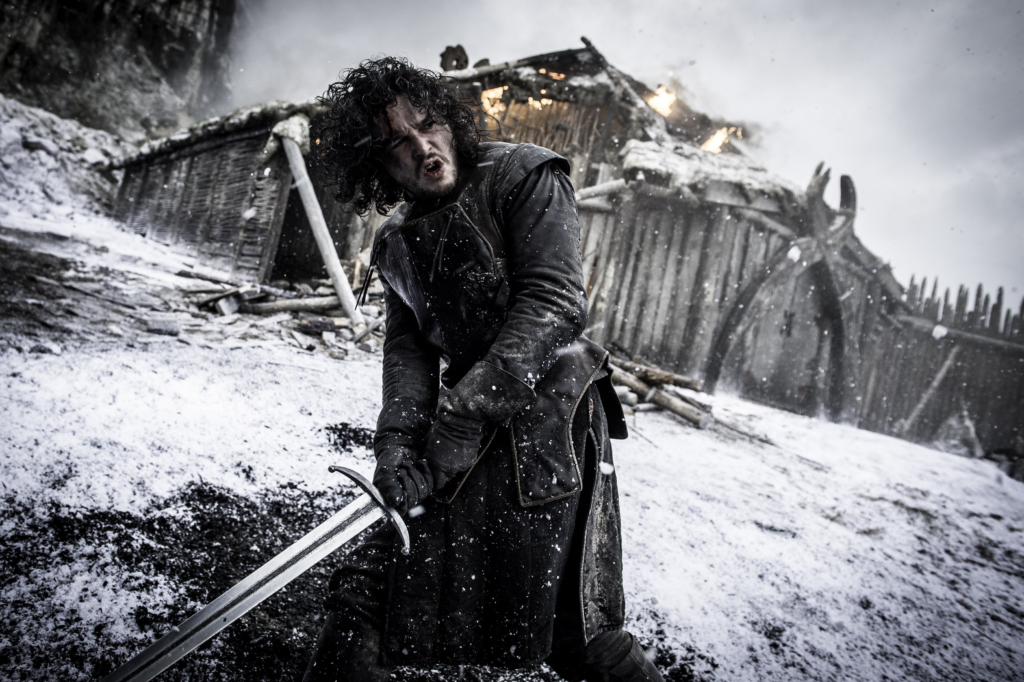
There were two standout things in this episode. The first is the scene with Tyrion and Daenerys talking about what it means to rule. The cool thing about this scene is that we finally get to see the two essential characters we have followed for several seasons but never met because they were on opposite sides of the world until now. In fact, this was undoubtedly my favorite scene of season 5.
We also finally get to see the complete terror of the White Walkers firsthand.
The White Walkers and their zombie army were in action, with all their mystical abilities in full display and their limited weaknesses as Jon’s Valyrian steel sword turned them into snowflakes. Its haunting ending, showing the properly introduced Night King resurrecting the dead, is the pants-ruining moment where you can no longer see a way to win this existential conflict. I would not rate this as a battle episode but rather a horror experience.
#8: Spoils of War [s7 e4] – Burn the Loot Train!
Despite season 7’s general problems, it still gave some memorable episodes.
Spoils of War features an Arya-Sansa reunion for the first time since season 1. Unlike Sansa’s other reunions with Jon and Bran, there’s no happy music or sappy emotions, it feels like two distant sisters meeting, and it’s like “heh, doing well”, like it’s not a big deal. It also has a funny Sir Davos Joke, “King Snow, wait, that doesn’t sound right, King Jon?” You would laugh too if you were both a Thrones fan and a history buff.
Finally, the meat of it – The debut battle between Jamie Lannister’s forces and Deanery’s Dothraki horde. What was cool for me was that we finally got a clash between the western and the eastern armies. One side is a medieval-style feudal army of mostly foot soldiers, facing basically the Mongols where everyone is on horseback. This is also the first time we see the Dothraki truly in action, the thundering of the screaming and thundering of their horses alone. They even stand on their horses when firing arrows. I also love this one moment where the Lannister/Tarly forces form a spear wall since that is the best way to repel horse charges. Accurate medieval warfare is undone by a dragon, which is the equivalent of an Apache gunship in this world.

One surprising fact about this episode is that this happens to be the shortest of the whole series. Excluding intro and end credits, it runs at just about 45 min. This is proof that you do not need a long wordy episode to be captivating and entertaining.
#7: The Lion and the Rose [s4 e2]
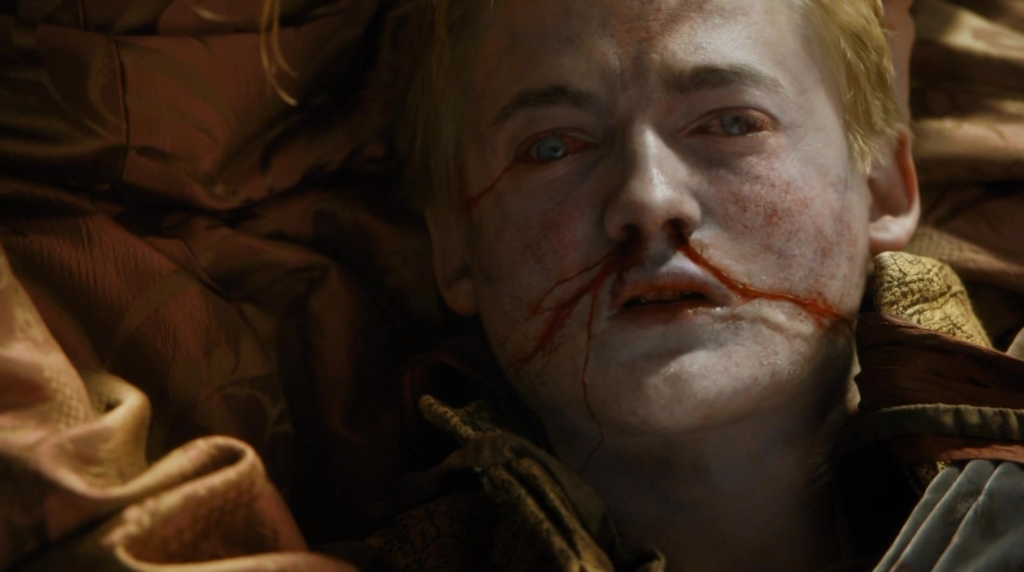
Joffrey has certainly earned the title of one of the most despised characters in television history. From his wee days of torturing prostitutes and animals for fun to becoming a cautionary tail of what could happen if rich siblings get busy (may result in European history). Appropriately enough, Joffery’s poisoning becomes one of the most satisfying villain deaths of the series. As brutal as Martin was to his protagonists, he gave all his villains a fittingly painful and embarrassing exit.
The only thing stopping us from cheering with joy outright is the fact that Tyrion is implicated in Joffrey’s poisoning, but that sets up the amazing follow-up…
#6: The Laws of Gods and Men [s4 e6] – Tyrion on Trial

Previous episodes have Tyrion portrayed as strong, confident and intelligent. Now he is slowly being broken down with his previous boyish actions such as locking up Pycel and mocking Joffrey have come back to haunt him. Eventually, after Shae’s testimonial and betrayal, the normally calm witty dwarf finally unleashes in the throne room in true /r/PublicFreakout glory – with Peter Dinklage nailing every second of it.
#5: You Win or You Die [s1 e7]

One of the recurring themes of Game of Thrones is that honor and nobility do not always win. In fact, it’s far rarer for honor and nobility to result in any positive outcome apart from some kind words in your memory.
Ned Stark’s plan to detain the then-Prince Joffrey using his title as lord protector does not sound bad on paper… except that it is under the assumption that everyone will follow the plan. Unfortunately, nobody was in on his coup attempt. This was foreshadowed earlier in Littlefinger’s arcs, where it’s quite clear that he’s the one who ultimately pays the city watch and that their loyalties are to their paychecks, not Ned. Both Renly and Littlefinger gave admittedly better plans, but both would have involved Ned Ignoring the rules of succession or killing the children, something the honor-bound Ned wouldn’t allow. In this world, the honorable route isn’t always the winning route, and Ned and indeed much of the Stark family would learn too late.
#4: And Now His Watch Is Ended

This episode was named after the sudden kill-off of Jeor Mormont, who led the Night’s Watch and served as a mentor figure to Jon Snow. In keeping with tradition, all the strong, morally right characters die. As satisfying as it was to kill Craster, he’s only been replaced by a dozen more Night’s Watch mutineers.
Jamie Lannister was another character that Martin deconstructed. In the first few seasons, he appears to be written as a stock villain (his debut appearance looks exactly like prince charming from Shrek) who’s sleeping with his sister, and all of King Robert’s kids are his, classy. He did, however, have some features that do not redeem him per se but show he is not heartless. He clearly loved and protected his brother, Tyrion (which is why he attacked Ned Stark), and before losing his hand, Jamie discouraged his Bolton captors from having their way with Brienne, indicating he does have a level of honor that was buried down.
This is the show’s point where Jamie becomes a more humbled character. Now some of his more cringy traits and toxic relationship still linger on to the bitter end, but this is how you write a complex character. In losing his hand, Jamie loses part of his identity; he is one of the greatest swordsmen in the realm. Over the course of subsequent seasons, Jamie has become a more complex person, and these were the episodes that first brought one of the most compelling characters to life.
The other stand-out moment was Daenerys finally got herself an army. At first, trading her favorite dragon only to turn the tables on the slavers. Now She leaves Astapor with an army in tow, hell-bent on “liberating” Slaver’s Bay and bringing her one step closer to Westeros.
#3: Baelor [s1 e9]

Unfortunately, Sean Bean is a walking SPOILER ALERT that should have seen coming.
Despite Ned’s fatal mistake and his imprisonment, there was this lingering hope and expectation that Ned could survive. It seemed incomprehensible that a show would kill its main character and in its first season at the very least. Well, that’s what happened, all because of our favorite incest boy Joffrey’s stupidity.
The genius of the first book, as well as the first season, was it formed more of a prologue in the grand scheme of things. Ned’s execution was the catalyst for the character stories we would ultimately follow in the shoes of Robb Stark, Jon Snow, and Tyrion Lannister. From there on, no character was truly safe and would be a formula repeated the following seasons (until the last 2), and this was the episode that set the bar.
#2: What Is Dead May Never Die [s2 e3]
Named after the main words of the Ironborn, this is a quintessential game of thrones episode. It serves as introducing new characters like Brienne of Tarth and, of course, for its namesake twists with Theon ultimately betraying Robb and the Starks in the name of vague loyalty to a family he hasn’t seen since childhood.
However, we picked this episode because this was Tyrion at his most intelligent. After Ned Stark’s beheading, Tyrion becomes the de-facto main protagonist. This was where Tyrion seemed the most in his element, as he’s effectively given absolute power over King’s Landing. Unlike Ned, Tyrion is actually good at playing the aristocratic game in Kings Landing, and he uses this episode to perform a master stroke.
In one scene, Tyrion meets separately with three advisors, proposing for his niece to marry three separate houses, knowing one of them would tell Cersei. It was this intelligent person that became sorely missed in the later seasons. In the show’s defense, Tyrion has spent a long time traveling, reading books, and reading people. He knows people more than power and which people had the most to lose, gain, and take.
There is also a strong quote at the end said to Varys: “Power resides where men believe it resides. It’s a trick – a shadow on the wall – and a very small man can cast a very large shadow.”, a perfect metaphor for this series.
#1 [Objective Best]: Rains of Castimere [s3 e9]
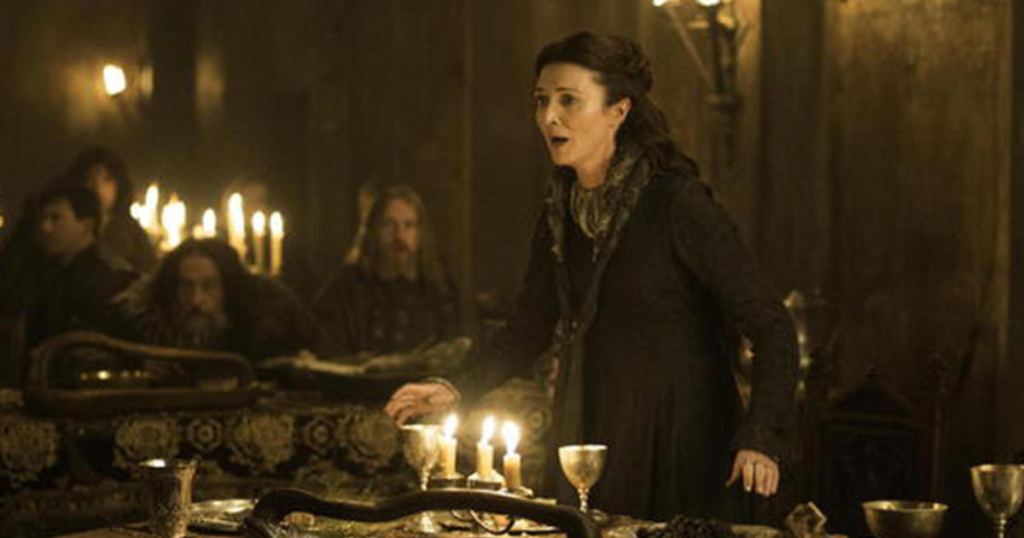
Just as the theme of noble but fatal mistakes has fallen on Ned Stark, the same fate inevitably falls through to his son and protege, Robb. Like his father before, Rob made serious mistakes in his campaign for family justice. In his case, it was backing out of his arranged marriage to one of Walder Frey’s daughters. Rob may have married for love, but not without consequences; by backing out of his marriage, he crossed a powerful potential ally, and halfhearted apologies ultimately prove not to be enough.
This wedding between his uncle Tully and his original bride was meant to mend the bridge (literally) between Robb Stark and Lord Walder Frey (brilliantly played by David Bradley / Filch from Harry Potter). At first, everything seems to be going well. Tully seems relieved about his new wife’s appearance, Arya is close to reuniting with her family, and even Catelyn seems final to be content with Robb’s marriage to Talisa. However, in true GoT fashion, something goes horribly wrong when everything seems to be going well. The doors shut, and the court musicians started playing the Rains of Castamere – a song about the murder of an entire noble family by the Lannisters, now playing for the Starks. Before you know it, Robb’s pregnant wife gets stabbed in the baby, Robb is riddled with crossbows, and all manner of gruesome deaths await the rest of Stark’s men. Catelyn makes a defiant last stand by cutting Frey’s wife’s throat but dies believing her entire family has been gone.
Needless to say, this was one of the most shocking moments in television history. So much so that it sponsored a new culture on YouTube where people watch other people’s reactions.
#1 [Subjective Favorites]: Battle of Bastards [s6 e9] + Winds of Winter [s6 e10]
Part 1: The Bastards
Objectively, Rains of Castamere is hands-down the best episode in the series, but these last two from season six are my personal favorites (you’re still reading my list, and I’ll do want). This is just another of these episodes that I had to put together.
Of course, this episode’s highlight is the battle itself. This is the first time the show has given us an open-field battle the earlier seasons have skipped because of budget constraints. Now, after six seasons, they have resources for more extras, props, and better effects to give a cinematic quality. It’s also helped by the fact that they’re dealing with smaller armies than other “epic” films.
I also like the fact It’s not like tens of thousands of men fighting like in other movies or even previous seasons. The Bolton’s forces are around 5000 total, while most of the other northern houses have roughly a few hundred each, and only a handful have come to Jon’s side. Indicating that the northern houses have been depleted compared to their strength in the earlier seasons. A nice bit of continuity there. Not to mention with winter already here, it’s even more difficult to raise a large force.
In my opinion, this is one of the best medieval battle sequences since Braveheart. The 1 min opening tracking shot is a perfect example of capturing the chaos of battle without resorting to shaky cam or quick edits.
It is also the perfect end For Ramsey Bolton to be eaten by his own hounds with Sansa watching.
Part 2: Winds of Winter – The true series finale

And now we come to the finale of season 6, where the series feels most triumphant for both our heroes and villains.
The moments of tension in the building before the trial and the High Sept blown up are further enhanced by another of Ramin Djawadi‘s best scores, giving an almost Dracula feel to the series.
We see a lot of recurring characters, including the High Sparrow, Mace Tyrell, the King’s hand Kevin Lannister, and especially Margery Tyrell blow up in the High Sept. It happened so fast that I almost didn’t realize Margery was among them until it was over. It almost would have blown the red wedding out of proportion (literally) if this moment hadn’t been foreshadowed to death by the fan community.
It may be Cersei’s most evil moment, but you have a little bit of satisfaction when seeing all the religious fanatics that defined the previous urban plot arcs blown away in one fell swoop. Interestingly despite Cersi’s grief for her other children, she’s relatively unphased about Tommen’s death, feeling that her son was already lost. The final loss of her children firmly establishes Cersei as the show’s next human antagonist.
These are my favorite episodes, but that doesn’t mean they are no faults. We never get a clear reason why Sansa never told Jon about the Knights of the Vale; why did Lancel follow this random kid for no reason into the crypts?
Some have also criticized this episode for teleportation, but to be fair, they never made clear the passage of time in these seasons. How did Varys teleport back to Daenerys? I’ve noticed there were Dornish and Tyrel ships in that fleet sent to Daenerys, so that’s probably so could have hitched a ride on one of them.
There’s also the teleportation of area Arya, but again the show doesn’t always make clear if some of these characters and events are in the exact same timeline. My only criticism with that scene is that I wish Arya disappeared after leaving Westeros at the end of season 4, (Her arc got stale when she was in bravos). This should have been the moment for Arya to reappear to finally get to kill Walder Frey, completing the Starks’ vengeance. Having this seemingly random servant girl turn out to be teenage Arya in disguise would have been a huge twist. It would have kept a lot of mystery to what Arya was doing, (would have at least shielded her from the Mary Sue arguments some fans had).
On top of all this, Bran’s visions have led him to the moment we as fans have all been waiting for. We see a young Ned Stark find his missing sister in the Tower of Joy in a pool of blood. Dying after a traumatic birth, she asks her brother Ned to keep her baby a secret, and through a beautiful score, we transition from the newborn opening its eyes to the face of Jon Snow 20 years later. This confirms a long-running fan theory that he was not Ned Stark’s son – but instead, the son of Reagar and Lyanna Stark, making Jon not just king in the north but potentially the rest of the Seven Kingdoms.
The ascension of the show’s three remaining players made this finale so special. Jon Snow becoming King in the North felt like a culmination of everything Snow has been through. From dead to king in the north, and it feels earned. This was also the rise of Cersi to the Iron Throne; with her new menacing outfit and all political opposition gone, Cersi now proclaims herself queen. This time there is no husband, strict father, or even loving children to restrain her, emerging as the show’s next antagonist. And of course, the moment we’ve been waiting for all these seasons. Daenerys finally sailed to Westeros to reclaim her birthright. I still have goosebumps every time I watch that ending. If only it had ended at that point.
In many ways, these two episodes felt like what the past six seasons have been leading to this point. In some ways, season 6 was the last of the conventional seasons.
Conclusion
Despite the controversy of these last few seasons, it is important to rewatch and appreciate this series more. Because of shows like this, we have even larger quality productions today. With the prequel series House of the Dragon in production, there is a chance to learn the previous lessons that are hard to learn.
